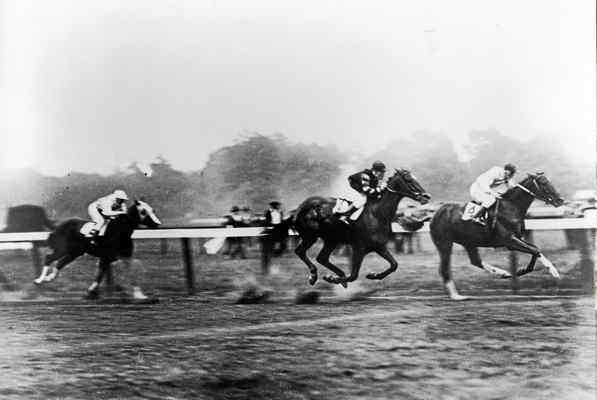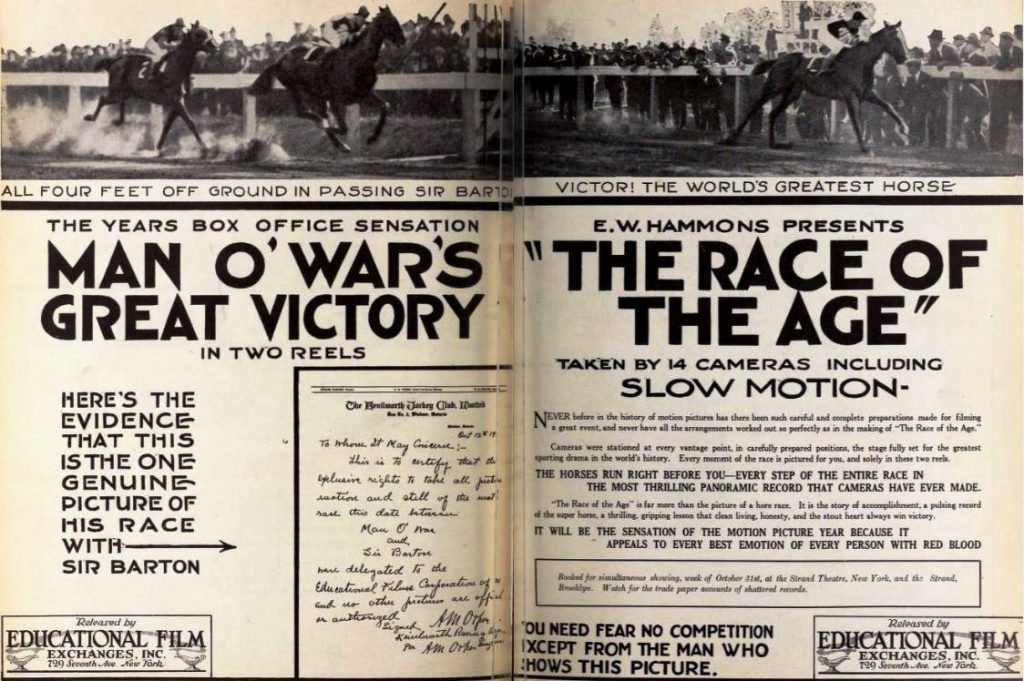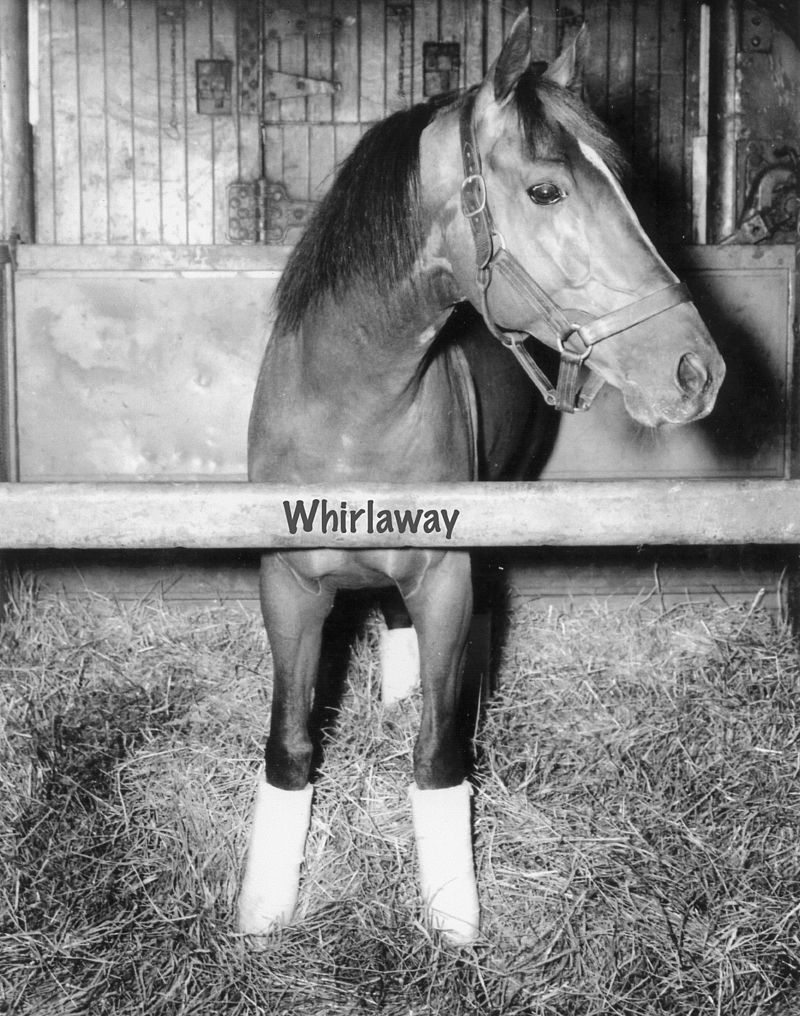
Man O’ War’s lone defeat to aptly named Upset– By C.C. cook – http://www.saratogian.com/article/ST/20150724/NEWS/150729755, Public Domain, https://commons.wikimedia.org/w/index.php?curid=69922639
By Dawn Le Fevre
On the racetrack they are called rogues – horses whose behavior is often as unpredictable and volatile as the weather. They are the cause of torn-up tickets for their fans and sleepless nights for their trainers. But when these bad boys finally put their minds to running, they can be glorious. And the most glorious of all was a chestnut colt with a fiery temperament who went on to become a legend. His name was Man O’ War.
Man O’ War is the measuring stick by which all other racehorses are judged. Winner of twenty out of twenty-one races. He broke track records with ease. He won carrying 130 pounds at the tender age of two and 138 at three. He once won a race by 100 lengths. Record crowds greeted him almost everywhere he ran and bet him down to ridiculous odds.
But Man O’ War had one major flaw – he was a hell raiser at the starting line. In his defense, there were no starting gates back in his day. Horses were circled and lined up behind a barrier which was then raised. If there one thing that Man O’ War lacked, it was patience. He just wanted to get out there and run. And on that fateful day in the Sanford Memorial, Man O’ War’s pre-race antics left him turned almost completely around at the start. Although he came charging down the stretch, Man O’ War fell a neck short to the appropriately named Upset. It was the one blemish on what should have been an undefeated career.

Man O’ War’s greatest son, War Admiral, not only inherited his sire’s speed but also his difficulties with the start. Unlike dear old dad, War Admiral had the benefit of a starting gate. And he absolutely despised it. He refused to load. He’d break through the doors. He was an assistant starter’s worst nightmare. But once that gate opened, he was a sight to behold. War Admiral won twenty-one out of twenty-six starts, had an unbeaten three year old season and swept the Triple Crown. Yet, on the day of what was to be his crowning achievement – the Belmont Stakes – War Admiral almost blew it. He suffered a complete melt-down in the gate, busting through the doors several times and delaying the start. When the race finally went off, he stumbled badly, slicing off a piece of his right front hoof. Trailing blood as he ran, War Admiral had every right to throw in the towel. Instead, he demolished the field in track record time.
They say that the true measure of a trainer’s ability isn’t how many races you’ve won but rather if you can win with difficult horses. And no one handled problem horses better than Ben Jones. Although he won an incredible six Kentucky Derbies and two Triple Crowns, Jones didn’t have it easy. He won his first Derby with Lawrin, a gluttonous horse with a fractious disposition. His 1952 Derby winner Hill Gail would throw tantrums in the paddock and bolt into the stable area. But Jones’ greatest challenge came from Whirlaway, a gorgeous chestnut colt with a dizzying late run, a long flowing tail, and a love affair with the outside rail.
Being a fan of Whirlaway was part exhilaration, part frustration. He had incredible acceleration yet lost races that he should have won by bearing out badly down the stretch. There was no telling what he might do in the Kentucky Derby. So Jones devised a plan – first, he hired the legendary Eddie Arcaro to ride the delinquent colt. Next, he cut the inside cup off of Whirlaways’s blinkers, giving him a full view of the inside rail. Wearing this one-eyed blinker, Whirlaway cruised to a record-setting Derby victory, swept the Triple Crown and scored a total of thirty-two wins in sixty starts.

But not all bad boys can be rehabilitated. Some make you think that they’ve changed their ways, only to relapse at the worst possible moments – as in the Kentucky Derby and Breeders Cup Classic. History has not been kind to Gate Dancer. He was a consistent, talented colt who earned over $2.5 million in purses. Yet he is most remembered for his disqualifications and zany equipment.
Gate Dancer came fully loaded – blinkers, a shadow roll, ear muffs, and a sure-win – but what he really needed was power steering. He bore in. He zig-zagged. He had no consideration for personal space and would often brush up against his rivals. Going into the 1984 Kentucky Derby, Gate Dancer had never finished off the board and was considered a legit contender. Until he drew post twenty – the far outside. Of course he broke slow. Then he swerved right and lost a ton of ground. Somehow he managed to launch an explosive run and nab a fourth place check. Or not.
In his rousing run down the stretch, Gate Dancer had repeatedly bumped Fali Time, the fifth place finisher. After a jockey’s objection and steward inquiry, he became the first horse ever to be disqualified for interference in the Derby. Gate Dancer had made the history books, just not in the way his beleaguered trainer Jack Van Berg had hoped. Still, he bounced back so well after the race that Van Berg decided to try again in the Preakness Stakes. And this time, his problem child performed beautifully – sweeping into the lead at the top of the lane and drawing off to win by two.
After tiring to sixth in the Belmont Stakes, Gate Dancer followed it up with victories in the Ak-Sar-Ben Omaha Gold Cup and Super Derby. It appeared that the colt had finally gotten his act together. Onto the 1984 Breeders’ Cup Classic. Thanks to Pat Day’s masterful ride, nobody was going beat Wild Again that day but Gate Dancer sure gave it his best shot. As did Slew O’ Gold. Midway down the stretch, it looked to be anyone’s race with the three of them gutting it out head to head. And then Gate Dancer, well, became Gate Dancer, crowding Slew O’ Gold and forcing jockey Angel Cordero to stand up right before the finish. Gate Dancer was disqualified to third and Slew O’ Gold was awarded the second place prize. Between his Derby and Breeders’ Cup disqualifications, Gate Dancer had lost a total of $376,000 in purses. How much money his long-suffering fans lost during his career will never be known.




